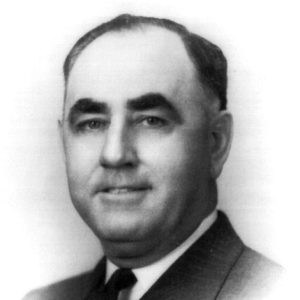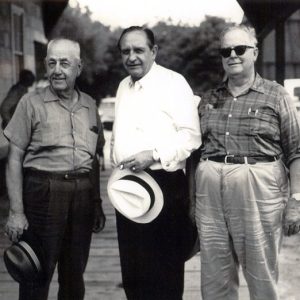calsfoundation@cals.org
Ben F. Butler (1894–1967)
Benjamin Franklin Butler served as mayor of Osceola (Mississippi County) for nearly three decades and was a well-known figure in civic and political affairs at both the state and county level. His tireless advocacy for economic expansion resulted in Osceola’s transformation from a small farm town into an industrialized small city.
Ben F. Butler was born in Osceola on January 29, 1894, to Clarence E. Butler and Ada Bragg Butler. Upon completion of his education in 1913, he went into business for himself, first as a car salesman and later in the farm implement business, eventually establishing an International Harvester dealership known as the Ben F. Butler Company. In 1919, he married Irene Tidwell of Memphis and had two sons, Ben Jr. and Gene.
Butler was first elected as Osceola’s mayor in 1938 after serving as a city councilman. At various times throughout his career, he served as president of the Osceola Chamber of Commerce, Rotary Club, and the Osceola School Board, as well as District Governor of Rotary International. In 1951, Butler was honored as Osceola’s “Man of the Year” in recognition of his extensive public service. At the state level, Butler was a member of the Arkansas delegation to the 1956 Democratic National Convention and was named to various boards and commissions by appointment of Governor Orval E. Faubus.
Newspaper accounts throughout the era describe Butler as Osceola and Mississippi County’s “most popular and influential citizen,” with his name consistently linked to progress and politics. Butler was also renowned as a “good will ambassador” in the neighboring states of Tennessee, Mississippi, and Missouri.
During the late 1950s, small communities and counties throughout Arkansas began to recognize that agriculture alone could no longer sustain the economy. Consequently, competition for industrial development became quite keen among small towns, counties, and other Southern states. The Osceola delegation, spearheaded by Butler, was very aggressive in its pursuit of industrial growth for the town and county, attracting several new plants and businesses to Osceola. In particular, it was due to Butler’s tenacity that the American Greeting Corporation of Cleveland, Ohio, agreed to establish a production plant in Osceola, spawning a decade of growth throughout the region.
Although Butler felt it imperative that Osceola expand its economic base, he clearly cherished its small town charm and conviviality, often stating that he hoped Osceola’s population would never exceed 10,000 for fear that “I won’t know everybody.” He loved to tell newcomers, “If you don’t like it in Osceola, you won’t like it in heaven.”
Butler left the mayor’s office in 1967 after being narrowly defeated for reelection. So high was Butler’s esteem throughout the state and mid-South that on June 10, 1967, a “Ben Butler Appreciation Day” attended by hundreds of well-wishers was held in Osceola. As a tribute to Butler’s career in public service, the Arkansas Municipal League named him Mayor Emeritus of Arkansas, an honor bestowed upon fewer than a dozen men at that time.
After several months of failing health, Butler died on July 28, 1967. He is buried at Violet Cemetery in Osceola.
For additional information:
Edrington, M. F. History of Mississippi County, Arkansas. Ocala, FL: The Ocala Star-Banner, 1962.
Jennings, Larry. The Commercial Appeal [Memphis]. East Arkansas Edition. November 21, 1960.
Mullen, Phil. The Osceola Times. June 15, 1967.
Wallace, Carolyn. Citizen-Journal. March 27, 1991, p. 1B.
Toney Schlesinger
Granite Bay, California
 Politics and Government
Politics and Government World War II through the Faubus Era, 1941 through 1967
World War II through the Faubus Era, 1941 through 1967 Ben Butler
Ben Butler  Ben Butler with Orval Faubus
Ben Butler with Orval Faubus 




I loved my Grandaddy. He was bigger than life. I will never stop missing him. I was ten years old when he died and am now sixty-six.